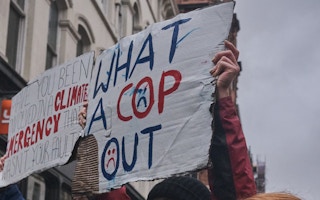It is strange hearing activist lingo being used by politicians, but in 2021, many leaders did try their best to get into the good books of the younger crowd – by adopting their style of speech once they took to the podium.
To continue reading, subscribe to Eco‑Business.
There's something for everyone. We offer a range of subscription plans.
- Access our stories and receive our Insights Weekly newsletter with the free EB Member plan.
- Unlock unlimited access to our content and archive with EB Circle.
- Publish your content with EB Premium.
For example, when youth activists and the media started warning against a climate ‘cop-out’ at the landmark COP26 summit, leaders parroted the exact same words, seemingly unconscious of how ironic it was, since the call was obviously targeted right at them. Of course, all of us knew that these speeches were made with good intentions, but it did come to seem rather fatuous in the end, especially when the leaders’ actions did not exactly match what they said.
The year’s sustainability-related trending terms also continued to reflect some of the anxieties of our time. Activists searched for the right words to describe outrageous acts of greenwashing and some ended up reinventing and building upon the vernacular already well-known to the rest of the sustainability folk.
There were also phrases with deep roots in grand old social theory, made popular and relevant once again because people tried digging deep to find something that could more accurately explain what they were feeling and experiencing.
Here are the 11 words and phrases to add to your vocabulary, if you don’t already know them:
Rainbow-washing
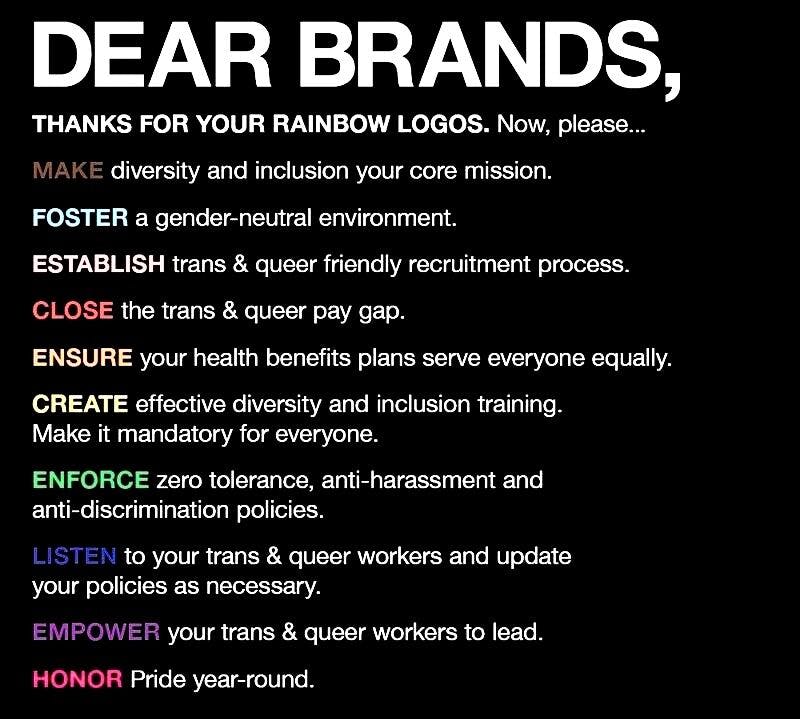
A guide of how brands can avoid rainbow-washing. Image: LinkedIn
As Pride month comes around each year in June, social media is flooded with logos decked out in rainbow colours, but is this show of public support for the LGBTQ+ community genuine?
‘Rainbow-washing’ is a term that builds upon our knowledge of ‘greenwashing’. It is a marketing tactic where brands commodify the support of LGBTQ+ communities without any affirmative action to back up their promoted stance. Essentially, it is performative activism for commercial gain.
Andee Chua, culture coordinator at HubSpot and co-founder of Kampung Collective, said that it is often easy to throw a rainbow flag up in the office during Pride month but companies need to pay attention to their marketing. The public should also look closely at the actions of a company and not just what they say, he said. “When investigating a company’s diversity and inclusion promises, look at their results – what have they done for the community?”
Brown-spinning
Brown-spinning refers to the practice of selling off the highest-emitting assets of a business to the top private bidders at a discount. It is another unorthodox way that companies use to acquire green credentials.
In 2021, it is estimated that the largest oil and gas companies sold off high-emitting assets totaling US$100 billion. Industry experts are now warning that more needs to be done to ensure transparency and accountability.
Decycling or Wishcycling
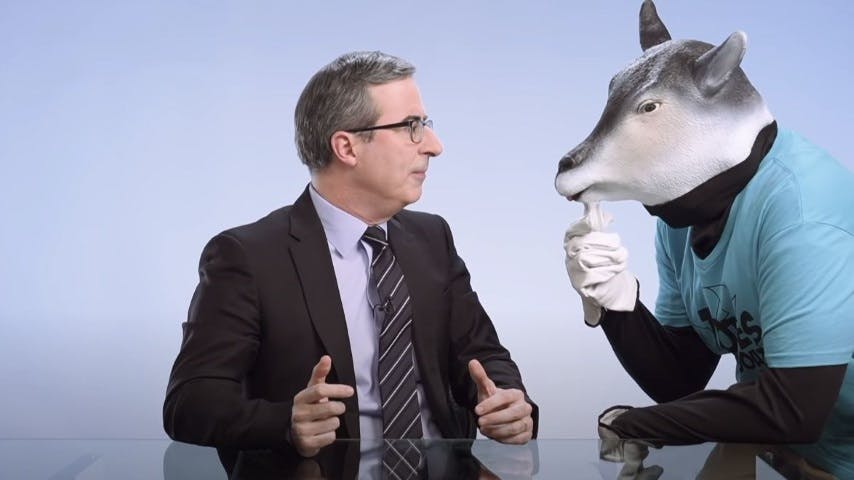
John Oliver explains why recycling is a sham and how plastics are everywhere on his talkshow. Image: YouTube
Both terms sound pretty ominous, and they are. The former refers to the act of anti-recycling. It is when one physically removes items that are in recycling bins and places them in the ordinary bins, or purposely messes up the recycling bins by adding difficult-to-sort items into them.
You might ask, “why would anyone do that?” But there are activists who have turned the language around in a creative way, asking for landfills and dumps to be known as ‘decycling points’. Rather than just encouraging recycling, some think that by reinforcing the idea that decycling, an antisocial behaviour that degrades the environment, should be discouraged, more can be achieved.
Wishcycling, on the other hand, turned mainstream when British-American comedian John Oliver used it on a ‘Last Week Tonight’ show in March this year. Oliver ran through the history of plastic waste, focusing on how the plastics industry “has managed to convince us all that it is our fault”.
“Businesses tell us that the products they sell are recyclable, and it wasn’t all that difficult for them to convince us,” he said, arguing that non-recyclable items sometimes turn up in recycling bins so often because of people’s “wish-cycling”, when they falsely wish that items they choose to chuck into the bins are recyclable.
“Wishcycling sounds like a spin class taught by a unicorn, or the sewage treatment system at Hogwarts: ‘This, children, is where we wish-cycle all your collected urine into this delicious butterbeer,” said Oliver. “The term is just too good to be wasted on garbage.”
Watch the episode here: Plastics: Last Week Tonight with John Oliver
Skin-clusivity
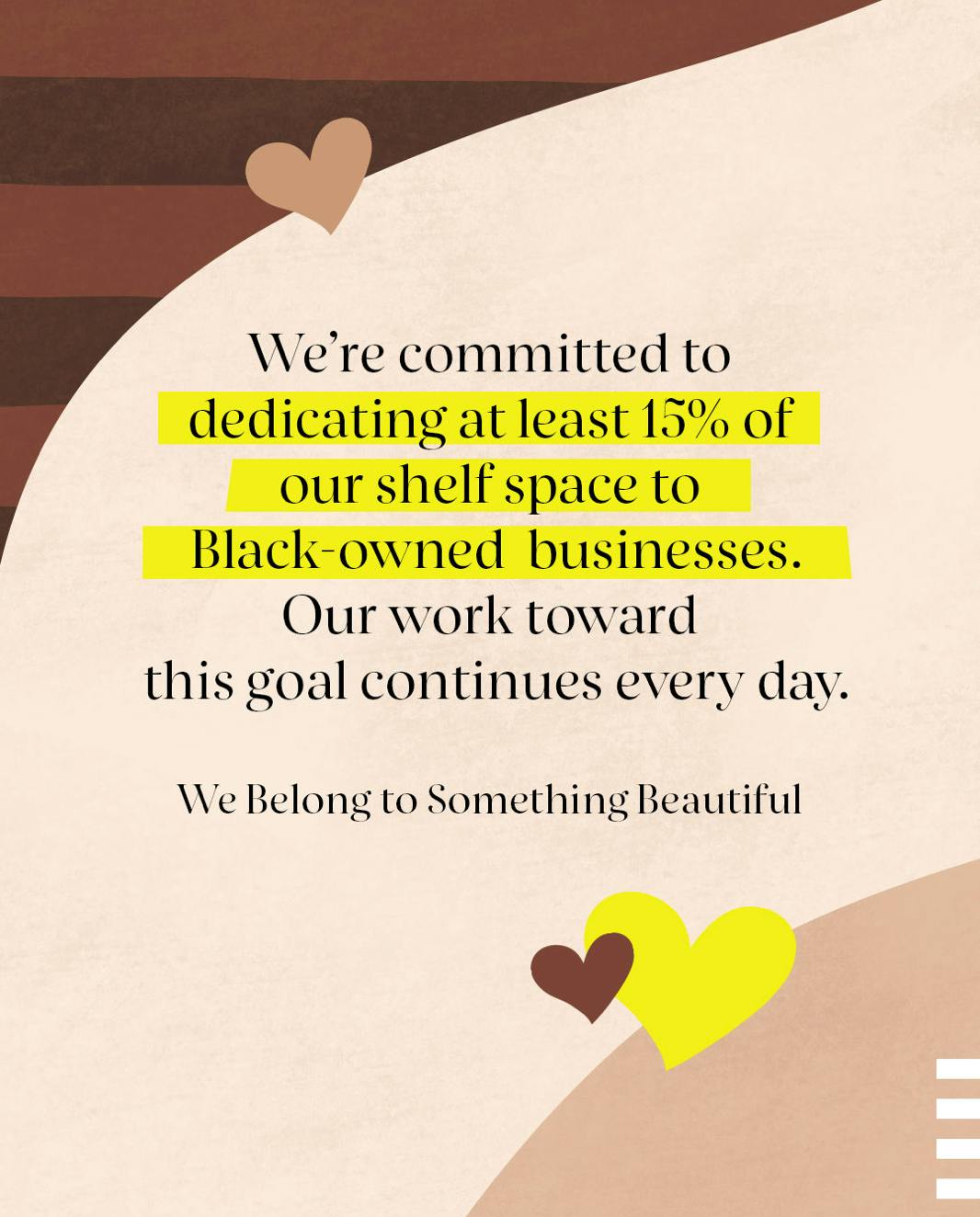
Sephora pledged to double the number of Black-owned brands on its shelves by the end of this year. Image: Sephora / Twitter
The concept of a one-size-fits-all beauty ideal is now being thrown out of the window. Large and well-known beauty brands are moving to reflect the larger movement, making sure that people of all skin types and colour are represented. A rising class of social media influencers is also shaking up the beauty world by promoting concepts of “skin-clusivity” or skin positivity. Breakouts, acne or ‘maskne’ (acne caused by wearing masks during the pandemic), scars and freckles need to all be embraced and celebrated, they said.
Beauty brands that have heeded the call include mass retailers like Sephora. Sephora pledged in February 2021 to double the number of Black-owned brands on its shelves by the end of the year. In April, Neutrogena also unveiled a new brand mission: “for people with skin”. It is meant to combat “inequality in skincare” as it pertains to socioeconomic status, race and ethnicity.
Intersectional
Realising that there is strength in numbers, activists are increasingly applying intersectional approaches to their environmentalism. The term was originally coined about 30 years ago by social theorists to help us understand how race, class, gender and other individual characteristics ‘intersect’ with one another. The idea has taken root in global climate and environmental movements. The Singapore Climate Rally movement made intersectionality its theme for this year’s virtual rally.
Involution
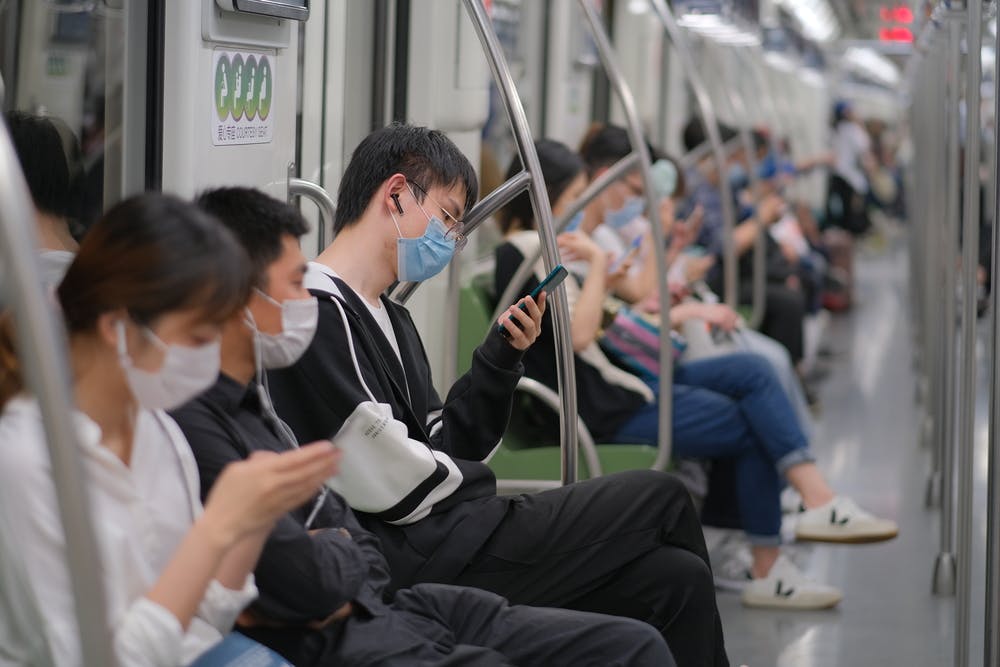
Passengers wear surgical masks to stem the spread of coronavirus, as they ride a subway train in Shanghai, China. Image: Reuters/Heo Ran, CC BY-SA 2.0
Involution, or 内卷 (neì juǎn), is a word that has entered the lexicon of Chinese youth. It is an interesting case of a sustainability-related word taking on different layers of meaning. Originally used to describe the workings of agriculture, where greater input, for example in labour, sometimes does not yield proportional output, or more crops and innovation, the term now describes burnout and ennui, and has spread to all corners of Chinese society.
It first gained traction on Douban, a social-media site popular among college students, when participants, mainly students who were anxious and stressed about being trapped in a status race, bemoaned the “involuted” job market, criticised “involuted” entrance examinations and lamented the “involution” of the post-pandemic economy.
Pandemials
The World Economic Forum (WEF), in its 16th edition of the Global Risks Report, used the term “pandemials” to describe a whole generation of youth aged 15 to 24 who are experiencing their second global major crisis within a decade — entering youth in the throes of the financial crisis and exiting it in a pandemic.
The WEF’s research suggests that Covid-19 has taken a disproportionate economic toll on the incomes of the young as many work in hard-hit sectors like service and manufacturing, often with limited job protection. Youth disillusionment is now a “critical threat” for the world, the report added. “Youth must be guaranteed a say in the global recovery. Failure to ensure youth a seat at the table risks entire societal and economic systems being rejected by this generation.”
Cop-out
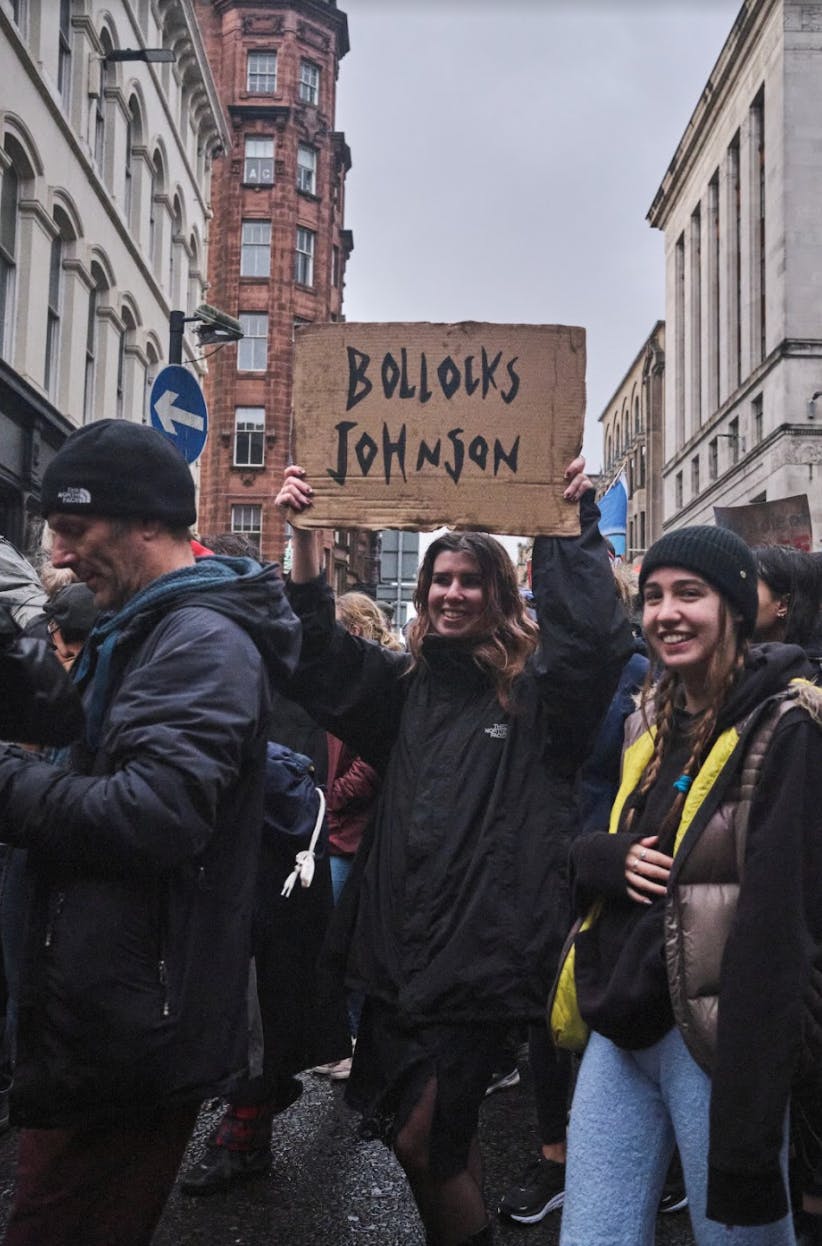
A protestor holding a sign with a twist on UK Prime Minister Boris Johnson’s name as a slur. Image: Fraser Morton/Eco-Business
Cop-out has come to mean an evasion or an escape from facing up to something. The punchy phrase was widely used during the COP26 landmark climate summit that took place in Glasgow in November, because many found it an apt description for climate inaction on the part of politicians and business leaders. British Prime Minister Boris Johnson made the front page of the papers when he reminded everyone not to let “COP26 be a cop-out”.
Real zero
The term “net zero”, which made our sustainability buzzword list in 2020, is now increasingly seen to consist only of hollow pledges. Activists and scientists say that the problem with net zero pledges is that they too often focuses on offsets rather than carbon emission reductions, allowing for “business as usual” to continue. The concept of real zero, a term newly coined, on the other hand, shifts the strategy away from offsetting, and is focused on eliminating emissions.
Climate competence
Boardrooms need directors with expertise in climate change and Environmental, Social and Governance (ESG) issues. The concept of climate competence gained momentum in 2021 and is now a key criteria or measure of a board’s adequacies. According to a report by the United Nations Intergovernmental Panel on Climate Change published in August, climate events will get worse and disrupt business operations and supply chains. For corporate boards, the focus is shifting from how a company’s activities impact climate to rethinking how climate can potentially impact the company’s own financial performance.
Eco-anxiety
The ethics of having children at a time of ecological crisis has emerged as one of the most widely discussed topics this year. While eco-anxiety, a condition defined as “a chronic fear of environmental doom” by psychological experts, is not yet officially considered a mental health disorder, surveys have shown that young people are increasingly distressed about environmental change. Some reportedly are choosing not to have children because they fear that doing so will amplify global warming. In one of the largest scientific studies yet on climate anxiety in young people conducted across 10 countries, almost 40 per cent of respondents said that they are hesitant about having children and would delay the process.
There might be no clear answers on what is the right thing to do, but governments and leaders need to see the signs and try to give youths greater confidence that their children will see a less devastating world.
Did we miss any? Let us know by writing to news@eco-business.com. This story is part of our Year in Review series, which journals the stories that shaped the world of sustainability in 2021.

